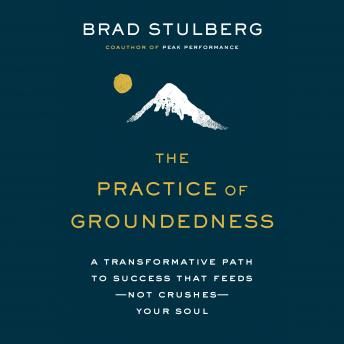The Practice of Groundedness – Brad Stulberg

Being rooted is the key.
The Principles Of Groundedness
Many people place too much emphasis on external achievements and see themselves as solitary individuals who must deal with their own problems.
The six principles of groundedness to practice for a more balanced attitude to life are accepting your current reality, staying present with it, being patient with your progress, allowing yourself to be vulnerable, embracing community, and keeping your body moving.
Accept your current reality as is and work toward the future you wish
Acceptance is simply admitting the truth about a problem in a calm, non-reactive, and neutral manner. It should be as neutral as possible.
If you have a negative thought, feeling, or occurrence, it’s as if you’ve already been pierced by one arrow. Responding with another negative attitude or feeling, on the other hand, is like shooting yourself in the foot with a second arrow, exacerbating the injury.
True Strength
Many people are unwilling to admit to themselves, let alone others, that they fall short of these unrealistic expectations.
True strength, on the other hand, requires accepting flaws. Being open and honest about your flaws takes a lot of guts.
It is also a liberating experience.
Body and mind are connected
In Western thought, there is a long tradition of seeing the mind and body as separate entities. However, current research suggests that they are more like two sides of the same coin – or, to put it another way, an integrated mind-body system.
For example, your gut bacteria can influence your mood, and your mental state can influence your heart rate.
Focusing on your origins is the antidote to heroic individualism
What enables a redwood tree to soar hundreds of feet into the air while buffeted by strong, sometimes violent winds? It is not the canopy of the tree that is constantly pushing to reach new heights. The roots are responsible for keeping it firmly planted in the ground.
When you’re grounded, you’re grounded in something—the people, activities, and aspects of life that matter to you the most. As a result, being grounded includes living in accordance with your beliefs and focusing your time and energy on the things that are most important to you, whether they are family, health, or spirituality.
Keep your body moving to keep your thoughts centered
Your body was made to move, not sit for extended periods of time. As a result, physical and mental health benefit from exercise. Although it may come as no surprise to some, the benefits of exercise can be astounding. Numerous studies have shown that it is one of the most effective methods for both preventing and treating depression and anxiety.
The definition of being rooted
Being rooted implies that you have inner strength, stability, and assurance. In this context, the word “inner” is significant. The sense of being grounded is not dependent on or derived from external accomplishments; it comes from within. As a result, it does not change as a result of successes and failures. It remains constant even in the midst of turbulence, assisting you in remaining calm and stable.
Stay present and patient to stay grounded in what matters to you and bring things to fruition
Consider your awareness to be like water. Because there is a limited supply, the question becomes, to which seeds will you give it?
You’re probably dividing it up too much instead of focusing on what’s most important to you. It’s partly because Western culture encourages people to be busy just to be busy, which leads to people becoming engrossed in busy work.
Start small
You won’t be able to benefit from groundedness concepts unless you put them into practice.
Make sure your objectives are attainable and reasonable; envision small steps rather than giant leaps.
To get your body moving, you don’t have to run a marathon or buy a gym full of expensive equipment. A daily 30-minute brisk walk could provide adequate aerobic exercise.
Burnout and misery are the results of heroic individuality
Do you ever have the feeling that no matter who you are or what you do, it’s never enough?
You could be suffering from heroic individualism, which is a common way of thinking in Western culture. It teaches people that regardless of who they are or what they achieve, it is never enough. Everyone wishes to increase their productivity, efficiency, and success.
People enslaved by heroic individualism are forced to perform far too many chores at far too fast a pace and under far too much stress.
As a result, they are disorganized, rushed, and exhausted. They can’t even sleep properly because they’re so preoccupied with their external accomplishments; when they’re not pursuing them, they feel empty or restless.
The perfect online persona
In real life, everyone has flaws, limitations, and challenges. They are hesitant to share their flaws because of the poisonous combination of social media and a culture of heroic individualism, which encourages people to always be optimistic, act invincible, and operate at 100 percent. They don’t want to come across as weak.
How people represent themselves
Many people nowadays lead parallel lives. They present themselves as strong, joyful, and successful individuals who are constantly living their personal and professional lives to the fullest, both online and offline.
- Consider the carefully chosen photos they post on Instagram and the achievements they boast about on LinkedIn.
- Consider the hypercompetent identities that people present in their workplaces.

